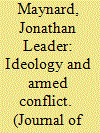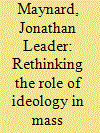| Srl | Item |
| 1 |
ID:
167287


|
|
|
|
|
| Summary/Abstract |
A growing wave of scholarship suggests that ideology has demonstrable effects on various forms of armed conflict. But ideology remains a relative theoretical newcomer in conflict research, and scholars lack developed microfoundations for analyzing ideologies and their effects. Typically, existing research has primarily presented ideology as either an instrumental tool for conflict actors or a source of sincere political and normative commitments. But neither approach captures the diverse ways in which contemporary social science theorizes the causal connection between ideas and action, and both struggle to reconcile the apparently strong effects of ideology on conflict at the collective level with the relative rarity of ‘true believers’ at the individual level. This article addresses such problems by providing key microfoundations for conceptualizing ideologies, analyzing ideological change, and explaining ideologies’ influence over conflict behavior. I emphasize that ideology overlaps with other drivers of conflict such as strategic interests and group identities, show how ideologies can affect conflict behavior through four distinct mechanisms – commitment, adoption, conformity, and instrumentalization – and clarify the role of both conflict pressures and pre-existing ideological conditions in ideological change. These microfoundational claims integrate existing empirical findings and offer a foundation for building deeper explanations and middle-range theories of ideology’s role in armed conflict.
|
|
|
|
|
|
|
|
|
|
|
|
|
|
|
|
| 2 |
ID:
134992


|
|
|
|
|
| Summary/Abstract |
There is a widespread sense amongst theorists of genocide and other violent atrocities that ideology matters. But in spite of this agreement all is not well with actual efforts to theorise ideology's role. Theoretical and empirical coverage has been uneven, and there has been little if any effort to incorporate theories and research from the actual specialist field of contemporary ideology studies. As a result, overarching theoretical accounts of the role ideology plays in violent atrocities remain limited and problematic. This article aims to encourage theorists to think about ideology in a more systematic and productive fashion by analysing four questions: (a) what do we mean by ideology?; (b) who, in cases of atrocity, might be relevantly affected by ideology?; (c) how do these people come to be influenced by atrocity-justifying ideologies?; and (d) how might ideology encourage these people to commit, or permit, mass violence? In discussing these four questions, I aim to clear up a number of misconceptions or vagaries that frequent current analyses of ideology in works on atrocity and political violence. I ultimately offer a suggestive account of six recurring “justificatory mechanisms” which collectively describe some of the common features of ideology's role across cases of mass atrocity.
|
|
|
|
|
|
|
|
|
|
|
|
|
|
|
|